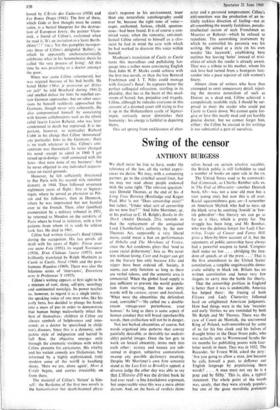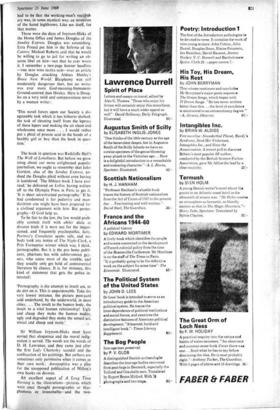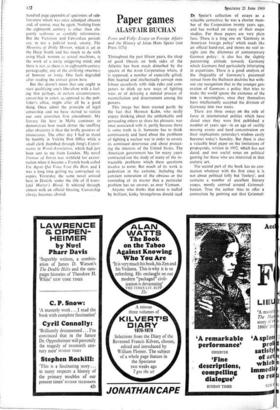Swing of the censor
ANTHONY BURGESS
We shall never be free to have, under the tolerance of the law, all the verbal experi- ences we desire. We may, with a consenting partner, go to the cislethal sexual limit, but we may not read about people endowed With the same right. 'The relevant question,' says Donald Thomas, at the end of his A Long Time Burning (Routledge and Kegan Paul, 80s) 'is not "Does censorship exist?" but rather, "Under what sort of censorship do we now live?"' And John Mortimer, QC, in his preface to C. H. Rolph's Books in the Dock (Andre Deutsch, 25s), reminds us that the replacement of the antiquated Lord Chamberlain's authority by the new Theatres Act, supposedly a very liberal move, could mean a ban on performances of Othello and The Merchant of Venice. since the Act condemns plays that 'tend to cause racial disharmony'. Just so. We never win without losing. Cunt and bugger can get on the literary bus only because kike and nigger• have been ordered off. Society, it seems, can only function so long as there are verbal taboos, and the semantic area is immaterial. When the global food supply is just sufficient to prevent the world popula- tion from starving, then the new dirty words will be caviare, oyster• and beefsteak. 'What were the obscenities the defendant used, constable?'—'He called me a double- cream vintage-year porterhouse, your honour' As long as there is some aspect of human conduct that will breed reprehensible words, then civilisation will not be in danger.
Not just barked obscenities, of course, but words organised into patterns that convey painfully desirable, or desirably (or undesir- ably) painful images. Once the law gets to work on lexical obscenity, terms melt into each other: ecstasy and nausea are sub- sumed in disgust, subjective connotations swamp any possible dictionary meaning. Despite Mr Mortimer's own firm semantic stand at the Last Exit to Brooklyn appeal, a divorce judge the other day was able to say that L'Histoire 10 was the dirtiest book he had ever read—a fine knockdown argument, but unpursuable since this was a mere obiter dictum. And, on the basis of verdicts them-
selves based on certain emotive vocables, the British public is still forbidden to read a number of books on open sale in the us.
The United States used to be comstocki- fied (Comstock, so Charles Rembar tells us, in'The End of Obscenity—another Deutsch book, 63s—was not a sour old man but a sour young one), but now this is all over. Racial squeamishness goes on—I remember an American Shylock who had to mess up the blank verse by omitting 'Jewish' in 'Jew- ish gaberdine'—but literary sex can go as far as it likes, which is pretty far. The struggle has been long, and Mr Rembar, who was the defence lawyer for Lady Chat- terley, Tropic of Cancer and Fanny Hill, gives a blow-by-blow account of it, but the opponents of public censorship have always had a powerful weapon to hand. 'Congress shall make no law . . . abridging the free-
dom of speech, or of the press. That is the first amendment to the United States' constitution, a tangible ungainsayable demo- cratic solidity in black ink. Britain has no written constitution and hence very few slogans to carry into the battle for liberty.
That the censorship position in England is better than it was is undeniable. America has helped there: the freeing of both Ulysses and Lady Chatterley followed hard on enlightened American judgments. How bad things were in the late 'twenties and early 'thirties we are reminded by both Mr Rolph and Mr Thomas. There was the case of Count de Montalk, the uncrowned King of Poland, well-remembered by some of us for his fine cloak and his halves of draught bitter in the Dean Street pubs, who was actually sent to Wormwood Scrubs for six months for publishing poems with four- letter words in them. That was in 1932. The Recorder, Sir Ernest Wild, asked the jury: 'Are you going to allow a man, just because he calls himself a poet, to deflower our English language by popularising these words? . . . A man must not say he is a poet and be filthy.' This is, alas, a typical statement. The whole point of the words was, surely, that they were already popular, but one of the great moralistic pretences
had to be that the working-man's vocaAul- ary was, in some mystical way. an invention of the hated highbrows. Like sex itself, for that matter.
Those were the days of Joynson-Hicks of the Home Office and James. Douglas of the Sunday Express. Douglas was astonishing. Ezra Pound put him in the Inferno of the Cantos; Michael Roberts said that he would be willing to go to jail for writing an ob- scene libel on him—not that he ever wrote it. I remember a two-page banner headline —THE MAN WHO HATES GOD—Over an article by Douglas attacking Aldous Huxley's Brave New World. Blasphemy was still moderately dangerous then, but no writer was ever more God-meaning-Immanent- Ground-centred than Huxley. Here is Doug- las on a very mild and compassionate novel by a woman writer : `This novel forces. upon our Society a dis- agreeable task which it has hitherto shirked, the task of cleaning itself from the leprosy of these lepers and making the air clean ,and wholesome once more . . . I would rather put a phial of prussic acid in the hands of a healthy girl or boy than the book in ques-
tion.' -
The book in question was Radclyffe Hall's The Well of Loneliness. But before we grOw smug about our more enlightened popular journalism, we ought to remember that John Gordon, also of the Sunday Express, en- dued the Douglas plaid without even having it laundered. 'The filthiest book I have ever read,' he delivered on Lolita, having written off to the Olympia Press in Paris to get it. 'It is sheer unrestrained pornography.' If he had condemned it for pedantry and man- darinism one might have been prepared for a civilised argument with him. But porno- graphy-0 God help us.
To be fair to the law, the law would prob- ably content itself with obiter dicta. at divorce trials if it were not for the impas- sioned, and frequently psychopathic, laity. Portnoy's Complaint seems safe, and no- body took any notice of The Night Clerk, a Prix Formentor winner which was, I think, pornographic. But it is the pro bono publi- cans, pharisees hot with subterranean gfy- sers, who cause most of the trouble, and they usually only get hold of controversial literature by chance. It is, for instance, this kind of statement that gets the police in- terested :
'Pornography is the attempt to insult sex, to do dirt on it. This is unpardonable. Take the very lowest instance, the picture post-card sold underhand, by the underworld, in most cities. . . . The insult to the human body, the insult to a vital human relationship! Ugly and cheap they make the human nudity, ugly and degraded they make the sexual act, trivial and cheap and nastic'
Sit William Joynson-Hicks must .have envied_ that eloquence and the moral indig- nation it served. The words are the words of D. H. Lawrence, and they came just after the first Lady Chatterley scandal and the confiscation of his paintings. But authors are sometimes only permissive when it comes to their own work : Areopagitica was a plea for the unopposed publication of Milton's own books on divorce.
An excellent aspect of A Long Time Burning is the illustrations—pictures which were once thought pornographic or blas- phemous or treasonable—and the two- hundred page appendix of specimens of sub- literature which was once adjudged obscene and, of course, may be again. Nothing from the eighteenth century is other than ele- gantly scabrous or candidly informative. But the Victorian and Edwardian periods are, to use a judicial word, smutty. The Memoirs of Dolly Morton, which is set in the Deep South and has much to do with using black women as sexual machines, is the work of a nasty sniggering mind, and there is not, as there is in eighteenth-century pornography, any of the civilising sweetness of humour or irony. One feels degraded after reading the extract given here.
But this doesn't mean that one ought to start qualifying one's liberalism with a feel- ing that perhaps, in certain circumstances, censorship in court, as opposed to the pub- lisher's office, might after all be a good thing. Once admit the principle of legal censorship and we have started to violate our own unwritten first amendment. My literary life here in Malta continues to demonstrate how much dirtier the snuffling after obscenity is than the lordly postures of insouciance. The other day I had to stand by humbly in Valetta Post Office while a small clerk thumbed through Jung's Expeii- ments in Word-Association, which had just been sent to me from London. My novel Tremor of Intent was withheld for exami- nation when it became a French book called Un Agent Qui Vous Vent Du Bien, and I was a long time getting my contractual six copies. Yesterday the same novel arrived here in Danish, under the title of (I trans- late) Martyr's Blood. It whizzed through almost with an official blessing. Censorship always becomes absurd.








































 Previous page
Previous page